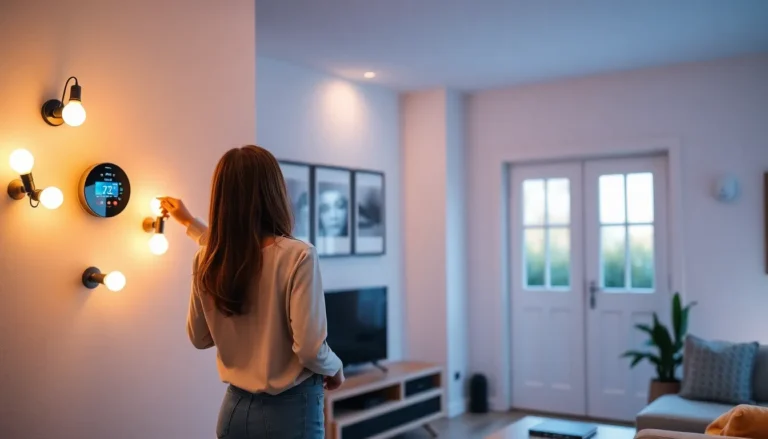Table of Contents
ToggleRenovating a townhouse can feel like embarking on a thrilling adventure—complete with unexpected twists and a dash of chaos. Picture this: a cozy space transformed into a stylish haven, where every corner tells a story and every room invites compliments. With a little creativity and some elbow grease, turning that outdated layout into a modern masterpiece is not just a dream; it’s entirely possible.
Importance of Renovating a Townhouse
Renovating a townhouse significantly enhances its market value. An updated property attracts potential buyers and generates higher sale prices. While cost is a consideration, investing in renovations typically yields a strong return on investment.
Improved energy efficiency appeals to environmentally conscious buyers. Upgrading windows, insulation, and HVAC systems lowers utility bills and creates a more comfortable living environment. Eco-friendly features often make the property more desirable.
Aesthetic upgrades enhance overall livability and personal satisfaction. Modern kitchens and bathrooms appeal to families and individuals alike. Creating inviting spaces fosters comfort and encourages social interactions.
Customization allows homeowners to tailor spaces to their lifestyles. Unique designs serve specific needs, whether for work-from-home setups or family gatherings. Personal touches transform houses into homes.
Safety improvements address potential hazards. Renovations can include updated wiring, plumbing, and structural repairs, reducing risks for residents. Prioritizing safety ensures peace of mind for everyone living in the townhouse.
Renovating also addresses maintenance issues. Aging properties often reveal underlying problems that need resolution. Carefully planned renovations remedy these concerns while refreshing the home’s appearance.
Finally, energy-efficient renovations contribute to sustainability. Choosing modern materials and technology promotes eco-friendly living. Sustainable practices resonate with a growing number of homeowners seeking a green lifestyle.
Overall, the importance of renovating a townhouse extends beyond aesthetics. Enhancing value, comfort, safety, and sustainability positions the property for long-term enjoyment and investment success.
Planning Your Renovation

Planning a renovation involves several key steps that lay the groundwork for a successful project. Understanding specific needs drives the initial phase of the renovation.
Assessing Your Needs
Assessing needs starts with identifying the primary goals of the renovation. Is it to increase space, improve functionality, or enhance aesthetics? Prioritizing requirements helps dictate the renovation’s scope. Gathering input from everyone who uses the space can provide valuable insights. Establishing whether a complete overhaul or targeted improvements are necessary streamlines the planning process. Evaluating existing conditions also reveals underlying issues that may require attention. Addressing these factors early ensures a more effective renovation.
Setting a Budget
Setting a budget creates a framework to manage costs throughout the renovation process. Determine the overall financial limits before diving into specifics. Break down the budget into categories such as materials, labor, and contingencies. Allocating funds proportionally to the most critical areas ensures essential upgrades receive priority. Researching costs for materials and labor fosters informed decision-making. Including a contingency fund of 10-20% helps mitigate unexpected expenses. Tracking expenditures diligently during the renovation safeguards against overspending.
Renovation Ideas for Townhouses
Renovating a townhouse offers an array of possibilities to create a contemporary living space while enhancing functionality. Here are a few targeted renovation ideas to consider.
Modernizing the Interior
Contemporary interiors embrace open layouts that improve flow. Replacing outdated fixtures with sleek designs can significantly elevate aesthetics. Implementing neutral color palettes creates a backdrop for personal decor, while careful selection of furniture maximizes both style and space. Installing built-in storage solutions optimizes room use, reducing clutter and enhancing organization. Artwork and decorative accents can serve as focal points, highlighting unique features throughout the townhouse. Additionally, updating flooring—be it through new hardwood or stylish tiles—transforms overall ambiance instantly.
Improving Energy Efficiency
Upgrading to energy-efficient appliances substantially decreases utility bills. Sealing windows and doors keeps conditioned air inside, promoting comfort and reducing energy consumption. Installing programmable thermostats allows for efficient heating and cooling tailored to occupancy patterns. Consider adding insulation in walls and attics, which enhances temperature regulation and reduces reliance on heating systems. Incorporating LED lighting not only cuts energy costs but also contributes to a longer lifespan for fixtures. Together, these improvements foster a sustainable living environment while positively impacting property value.
Challenges in Renovating a Townhouse
Renovating a townhouse presents unique challenges that can complicate the transformation process.
Dealing with Space Limitations
Space constraints often pose significant challenges during a renovation. Townhouses typically feature smaller layouts, which can restrict design possibilities. Creative storage solutions become essential to maximize functionality without overcrowding. Open floor plans can help create an illusion of more space, but careful planning remains crucial. In some cases, incorporating multi-functional furniture can enhance usability. Utilizing vertical space for storage or decor allows better use of limited areas. Custom built-ins can blend style with function, creating a seamless look. Prioritizing essential changes over cosmetic upgrades often leads to a more effective renovation strategy.
Navigating Building Regulations
Navigating building regulations represents another challenge in townhouse renovations. Local codes and zoning laws dictate what modifications are permissible. Understanding these regulations becomes necessary to avoid costly fines or project delays. This process may involve obtaining permits for structural changes, electrical work, or plumbing adjustments. Experienced contractors can provide invaluable guidance during this phase. They help ensure compliance with safety standards, preserving the integrity of the building. Additionally, engaging with homeowners’ associations can clarify restrictions on exterior modifications. An informed approach to regulatory challenges ensures a smoother renovation experience.
Hiring Professionals vs. DIY
Deciding between hiring professionals or tackling renovations as a DIY project holds significant implications for townhouse transformations. Professionals bring expertise, ensuring adherence to building codes and maximizing design potential. These experts can navigate structural challenges and provide innovative solutions tailored to specific needs.
On the other hand, DIY projects give homeowners control over budgets and timelines. Individuals often find satisfaction in completing tasks themselves and can realize substantial cost savings. Tackling simpler tasks, such as painting or new flooring installation, can be manageable for those with basic skills.
Engaging licensed contractors can guarantee high-quality workmanship. They possess the knowledge to select appropriate materials and techniques that enhance energy efficiency while meeting aesthetic goals. Relying on their experience reduces the likelihood of costly mistakes during renovations.
With a DIY approach, thorough research and planning become essential. Homeowners must acquire tools and materials, which can accumulate costs and extend project durations. Failing to account for unforeseen obstacles, such as plumbing or electrical issues, may lead to delays and increased expenses.
Assessing the complexity and scope of the renovation plays a critical role in decision-making. For extensive projects requiring specialized skills, hiring professionals remains the most prudent choice. Comfort levels with various tasks also influence whether to DIY or enlist assistance.
Ultimately, a hybrid approach often proves beneficial. Homeowners can handle smaller tasks independently while entrusting significant aspects, like plumbing or structural work, to qualified professionals. This strategy consistently balances cost, quality, and personal satisfaction.
Renovating a townhouse offers a unique opportunity to blend creativity with functionality. By carefully planning and executing renovations, homeowners can transform their spaces into modern, efficient havens that reflect their personal style.
Investing in such improvements not only enhances livability but also significantly boosts the property’s market value. Whether opting for professional help or tackling DIY projects, the right approach ensures a successful renovation journey. Ultimately, a well-executed renovation can lead to lasting satisfaction and a home that stands out in the market.







